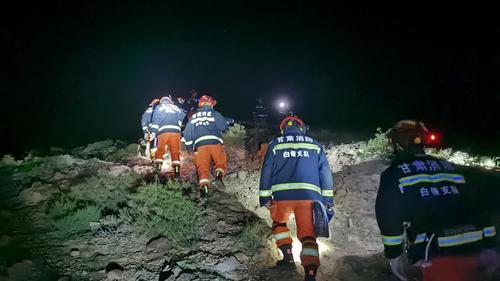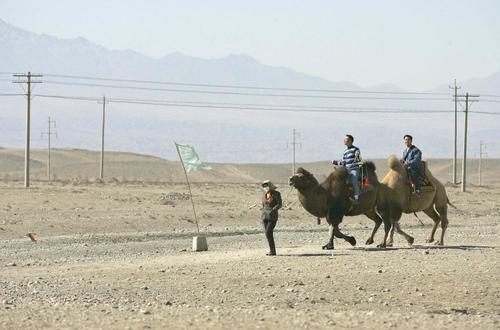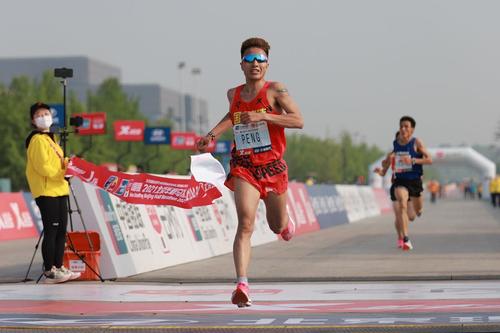"Man-Made Catastrophe" - China Race Organizer Blamed After 21 Ultrarunners "Froze To Death" In Extreme Weather
Authored by Nicole Hao via The Epoch Times,
The Chinese communist regime announced on May 23 that 21 athletes, including China’s marathon champions, died at the Gansu ultramarathon due to the extreme weather.
The death list includes Liang Jing, 31, China’s ultramarathon record holder, Huang Guanjun, 34, winner of the men’s marathon for hearing-impaired runners at China’s 2019 National Paralympic Games, and famous ultramarathon runners Huang Yinbin and Cao Pengfei.
“All elite ultramarathon runners died,” a Chinese netizen wrote on Weibo on Sunday.
From videos and photos that surviving sportsmen shot onsite and shared on social media, the athletes dressed in shorts were stuck in no man’s land and couldn’t procure clothes to stay warm or food to keep going.
“This is definitely a man-made catastrophe!” a Chinese netizen from Guangdong Province commented on a news report of the official’s statement on May 23.
“These 21 people were frozen to death!” wrote Chinese media The Economic Observer in a commentary on Sunday asking the Chinese regime to reflect on the tragedy. “If the organizer can set up a medical tent every five kilometers, the disaster can be avoided to a large extent.”
Tragedy
The Gansu ultramarathon is held at Yellow River Stone Forest Park in Baiyin city, northwestern China’s Gansu Province by the local government, together with a five-kilometer and a 21-kilometer run.
The mountain race is 100 kilometers (62.14 miles) long, and is between 5,000 feet to 9,000 feet above sea level, according to the official announcement. The race started at 9:00 a.m. on May 22, and the organizer estimated that all athletes could finish the race on the second day.
“At around noon, the high-altitude section of the race between 20 and 31 kilometers was suddenly affected by disastrous weather,” Baiyin Mayor Zhang Xuchen said at Sunday’s press conference.
“In a short period of time, hailstones and ice rain suddenly fell in the local area, and there were strong winds. The temperature sharply dropped.”
Chinese runner Jing Liang competes during the 170 kilometres Mont Blanc Ultra Trail (UTMB) race around Mont-Blanc, crossing France, Italy and Swiss, in Chamonix, France on Aug. 30, 2019. (Jean-Pierre Clatot/AFP via Getty Images)
State-run The Time Weekly on Sunday interviewed three surviving runners who presented a more complete picture.
There were 172 athletes who participated in the ultramarathon. All of them are professional runners because “the mountain race needs to be finished within 20 hours. Non-professional ones can’t make it at all,” Gao Shuang told the outlet.
It was windy and cloudy in the early morning, but the organizer didn’t suggest the runners carry warmer clothes, such as outdoor jackets.
“The weather wasn’t good when we started. But I followed others because they kept on running,” Feifei (anonymous) told the Weekly. “At 1:00 p.m., the rain became heavier and the wind was likely to blow me away at any time.”
The best runners were at the phase between station CP2 to CP3 of the race, which “is the most difficult part. It’s about eight kilometers (4.97 miles) long, but the altitude increased 1,000 meters (3,280 feet). The road is very steep, mixed with rocks and mud. We had to use both hands and feet to climb,” Gao said.
Li Liang (anonymous) was between station CP 1 to CP2 and was among the runners who decided to leave the race as soon as the weather got bad. He ran into the CP2, where he could find hot water and food as quickly as possible.
“The rain hit my back like needles. We (runners at CP2) shared our concerns and decided to quit,” Li said.
Tourists ride the camels in the Gobi near the famed tourist attraction Jiayuguan Pass, in China’s northwestern Gansu Province on Oct. 13, 2005. (Liu Jin/AFP via Getty Images)
At that time, Gao was in the middle between CP2 and CP3 with many better runners in front of him. He didn’t give up because he didn’t receive the notice from the organizer that the race should be stopped, and he wanted to win.
However, Gao quickly changed his mind due to the cold.
“All my ten fingers lost their sensation. I put my finger into my mouth, but my tongue was cold as well,” Gao said. He decided to go back to CP2 because “even motorbikes can’t cross the road, so there’s no supplement at CP3.”
On the way back to CP2, Gao met many runners who were on the edge of death.
“I saw a large number of them lying on the ground who couldn’t stand any more. About six or seven of them had white foam in their mouths.”
Gao said he was sad that he couldn’t help others because he himself was almost frozen and had limited energy to keep going.
“The runners who were rescued were the ones who were still conscious and could walk back themselves,” said Feifei. She went back to rescue others after warming up.
The race was called off by 2 p.m. Saturday, but it was too late.
On the afternoon of May 23, local time, Baiyin city government announced 21 athletes had died, eight had been injured and hospitalized, and others were rescued.
Peng Jianhua celebrates after crossing the finish line to win first place in the men’s category during the 2021 Beijing Half Marathon at Tiananmen Square in Beijing, China on April 24, 2021. (Lintao Zhang/Getty Images)
Man-Made or Natural
On May 23, state-run media tried to explain that the disaster was caused by weather and that forecasters were wrong. However, a large number of Chinese netizens started to question the organizers’ preparation.
The Economic Observer compared the Gansu ultramarathon with other cross-country races. In the Gobi desert marathon in Mongolia, organizers prepared watermelon and other food and drinks for athletes along the way. But in Gansu, the athletes had nothing for most of the race.
The article pointed out that local weather is unstable in spring and the organizers know clearly that some parts of the race can’t be reached by any vehicles. However, they didn’t arrange standby helicopters either.
Private media Kuai Tech reported on Sunday that shepherd Zhu Keming was herding goats nearby when the catastrophe happened. He set up a fire in a cave that he owned, and rescued six runners by moving them to the warm cave and covering them with quilts.
The Economic Observer suggested the regime reflect on the tragedy and organize the competition in a professional way in future.
https://ift.tt/3hRX6Nd
from ZeroHedge News https://ift.tt/3hRX6Nd
via IFTTT








0 comments
Post a Comment